
Both male and female killer whales will remain with their mothers throughout their lives. Image: David Ellifrit/Centre for Whale Research
Long menopause allows killer whales to care for sons.
Biologically speaking, menopause is a bizarre concept. Very few species have a prolonged period of their lifespan when they no longer reproduce. Besides humans, killer whales are among the few species whose females lose their ability to reproduce well before the end of their natural life span, but for what benefit?
Despite their well deserved reputation as one of the most deadly predators in the world, male killer whales live with and depend on their mothers well into adulthood. In fact, both males and females will travel with their mother throughout their lives and receive support from her, much like humans.
Research from the Universities of Exeter and York, UK, the Center for Whale Research, US, and Pacific Biological Station, Canada, suggests that this dependence may be the reason behind why whale mothers, much like humans, live long past menopause. “It has long been known that female killer whales stop reproducing in their 30s or 40s, but can survive up into their 90s. In fact the oldest female at the moment is estimated to be over 100 years old!” said Emma Foster, lead author on the paper published in the journal Science.
The study looked at more than three decades of data from tracked orcas, and found that males over thirty are 14 times more likely to die once their mothers have passed away. Although females over 30 also usually stay in the vicinity of their mothers, the difference is just under three-fold. For females under the age of 30, the death of their mothers had no effect on their survival rates.
The researchers are still unsure of the exact reasons behind the adult male’s decreased chances of survival after their mother’s death. “It illustrates how difficult these animals are to study in the wild, they are particularly problematic as they spend the majority of their time below water, making them difficult to observe,” Foster states. “However, we have a few ideas about what could be going on here; we can speculate that they may provide help with foraging, or support during encounters with other whales.”
The discovery could help to explain why both human and killer whale females often live longer than males. The life span differences for killer whales are profound — females frequently survive into their 90’s while males are rarely documented as living much past 50.The current paper is part of a much larger project which aims to look at the mechanisms underpinning this prolonged female post reproductive lifespan. Researchers are now focusing on how exactly mothers are helping their sons.






